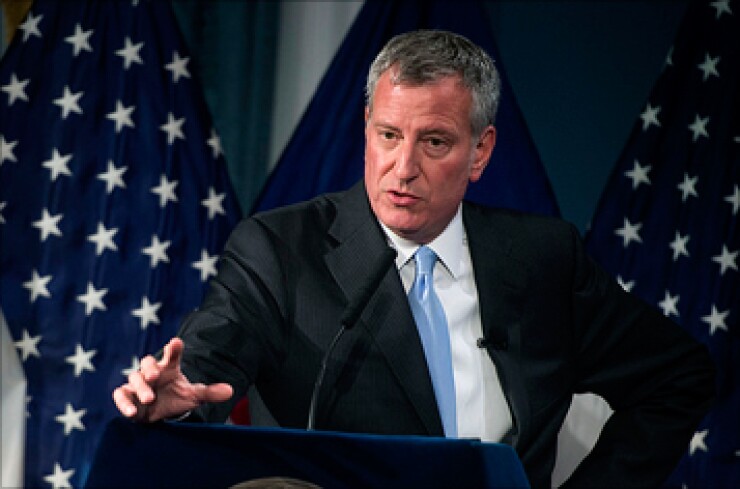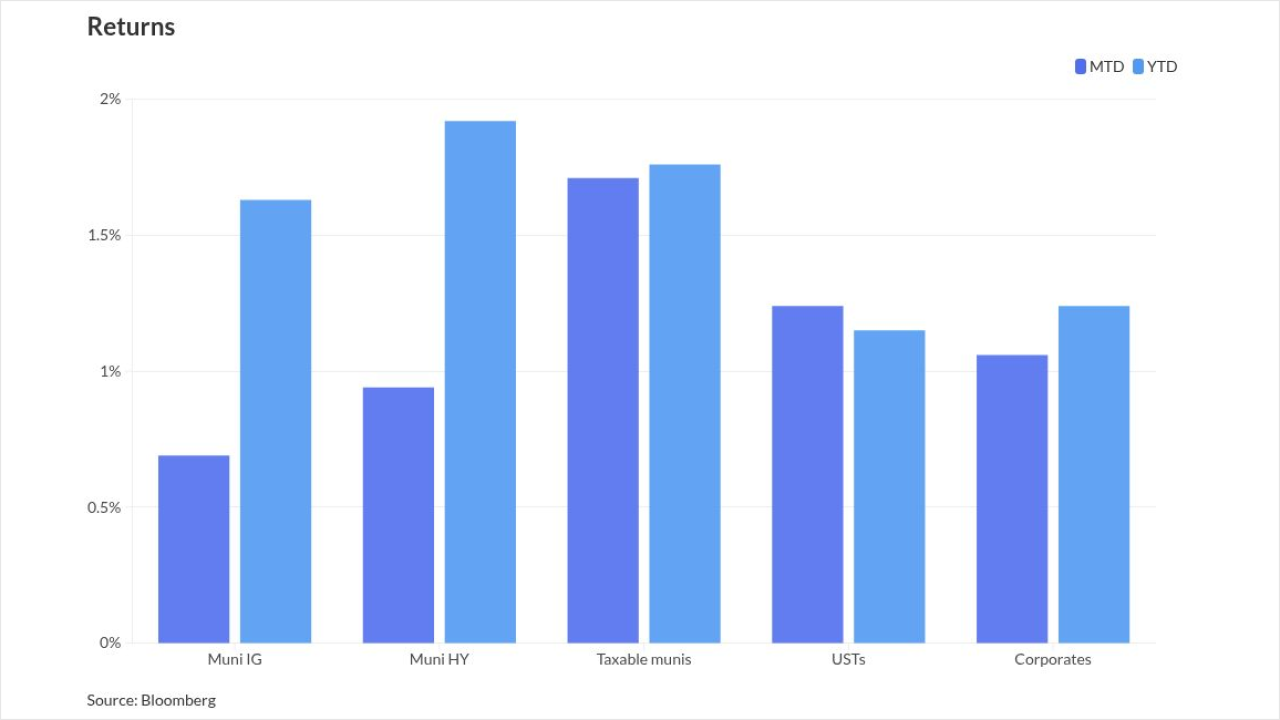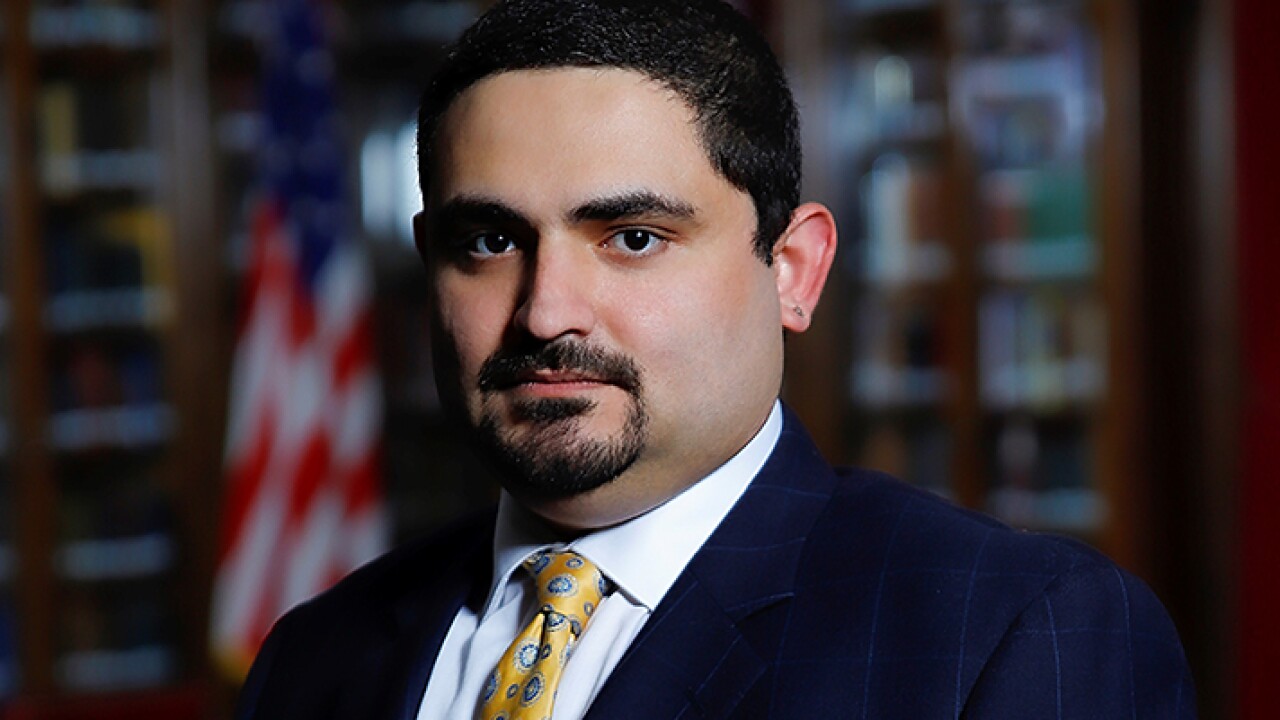
New York Mayor Bill de Blasio unveiled his $82.2 billion executive budget, which he said relies on “progressive, responsible and honest budgeting.”
In the proposal released Tuesday, De Blasio boosted the city’s reserve funds, adding $250 million to the Retiree Health Benefits Trust for Fiscal 2017. In total, the budget includes $1 billion each year in the general reserve; $3.7 billion in the Retiree Health Benefit Trust; and $500 million in the new Capital Stabilization Reserve.
The executive budget also found $1.3 billion of savings in addition to the $1 billion of savings already made in the preliminary budget he presented earlier this year, for a total of $2.3 billion of savings overall. In January, De Blasio released an $82.1 billion preliminary spending plan, which compared with the city's adjusted $81.7 billion budget.
“At a first glance, the mayor’s executive budget mixes prudent revenue estimates, new spending needs and additional budget reserves,” said Ronnie Lowenstein, director, NYC Independent Budget Office. “The plan also contains a savings plan that includes savings from debt service. Still, debt service remains one of the fastest growing parts of the city budget, rising from $6.0 billion this year to nearly $8.2 billion in 2020.”
The City Council must now approve a final budget for Fiscal 2017, which begins on July 1. The council will hold hearings on the executive budget from May 6-26 and vote on the final spending plan on June 5. Last June, the council passed a Fiscal 2016 budget of $78.5 billion.
“The mayor's new financial plan contains mixed messages of short-run optimism and significant new spending on the one hand and longer-term cautious revenue estimates and modest reserves on the other,” the Citizens Budget Committee said in a statement on Tuesday. “The hope is increased spending can be sustained in more difficult economic times through implementation of an enhanced Citywide Savings Plan and other gap closing measures; but many of the anticipated savings, particularly those for NYC Health + Hospitals (H+H), are uncertain, putting future budget gaps at risk of mushrooming.”
New York City’s tax revenue growth is expected to slow to 3.6% in 2016 and 1.9% in 2017, De Blasio said. This compares with an average growth rate of about 7% over each of the past five years.
Wall Street is a major engine of the city’s economy and so is an important calculation in the city’s budgeting. Financial firms’ profits are expected to fall to $10.6 billion in 2016 from $16.0 billion in 2014, De Blasio said, adding that securities sector bonuses have fallen over the past two years and are expected to continue to decline.
Another big area, the commercial real estate market, is also expected to decline in 2016 from a record year in 2015.
“Recognizing signs of a slowing national economy, the financial plan relies on conservative economic projections,” the CBC said. “The budget retains wisely reserves of $1.5 billion and adds $250 million to the Retiree Health Benefits Trust Fund to bring its total balance to $3.7 billion -- the highest ever.”
In terms of demographics, the city’s population has grown at the fastest rate since the 1920s, reversing a 70-year trend, and now has a net positive migration across all five boroughs and a 4.6% growth rate overall. Employment has risen to an all-time high of nearly 4.3 million jobs in the city.
With regard to its municipal workforce, De Blasio said his administration has settled union contracts with 95% of city employees. The agreements include $3.4 billion in healthcare savings through Fiscal 2019 and $1.3 billion in every year after that, he said.
“City-funded spending in fiscal year 2017 will be $2.5 billion greater than fiscal year 2016 (not including $1.5 billion in reserves),” the CBC said. “The budget adds $1.2 billion in new agency spending in fiscal year 2017, including $339 million more for the Department of Homeless Services and the Human Resources Administration, $217 million more for the Department of Education, and $160 million more for H+H.”
In the third executive budget he has presented to the City Council, de Blasio also added significant funding to help the city’s fiscally challenged public hospital system.
Ahead of the budget, De Blasio released a report outlining the city’s plan to fix a forecasted $600 million budget gap at H+H, formerly known as the Health & Hospitals Corp.
As part of the Executive Budget, the city will support H+H by adding $160 million in Fiscal 2016, which grows to $180 million each year afterward. This will bring the city’s total commitment to almost $2 billion by Fiscal 2020.
The city will also make a $100 million capital investment in new infrastructure, shifting from inpatient care to ambulatory care and outpatient services.
At the same time, De Blasio will push the state and federal government for higher reimbursement levels for providing healthcare to those uninsured and low-income residents enrolled in the Medicaid program. H+H serves more than 1.2 million New Yorkers each year and is the largest municipal health system in the nation. About 70% of its patients have no health insurance or are on Medicaid.
Even with this new money, the city said H+H still must close a gap estimated at $1.8 billion for Fiscal 2020 without city intervention.
“The city will also forgive H+H's debt service payments, worth $180 million in fiscal year 2017 and more in later years, as part of a plan to support H+H as it implements a savings plan,” the CBC said. “In addition, the savings plan for H+H relies largely on Medicaid revenues that require waivers that must be approved by the Federal government, an uncertain proposition. Failure to obtain these waivers, increase MetroPlus revenues, and/or implement expense reductions will place additional stress on the city's coffers.”
In the report released with the budget entitled One New York: Health Care for Our Neighborhoods, the city said it will focus on stabilizing funding, expanding community-based healthcare, improving efficiency, and remodeling the system.
“Over the past 13 years, 18 private hospitals have closed throughout New York City,” de Blasio said. “This plan will not close any more hospitals or layoff any workers, but expand comprehensive healthcare, especially in high-need communities.”
The plan focuses on increasing productivity and generating revenue through a variety of means including enrolling the uninsured in health insurance; expanding the city’s coordinated care models for residents currently ineligible for insurance; and using technology to streamline day-to-day operations.
“I don’t think the mayor is addressing the fact that there are too many hospitals in this city,” said Howard Cure, director of municipal bond research for Evercore Wealth Management. ”I think he is torn over the fact that they provide good-paying jobs in many poor neighborhoods.”
Cure added the city needs to find some real savings to address the system’s chronic fiscal problems.





